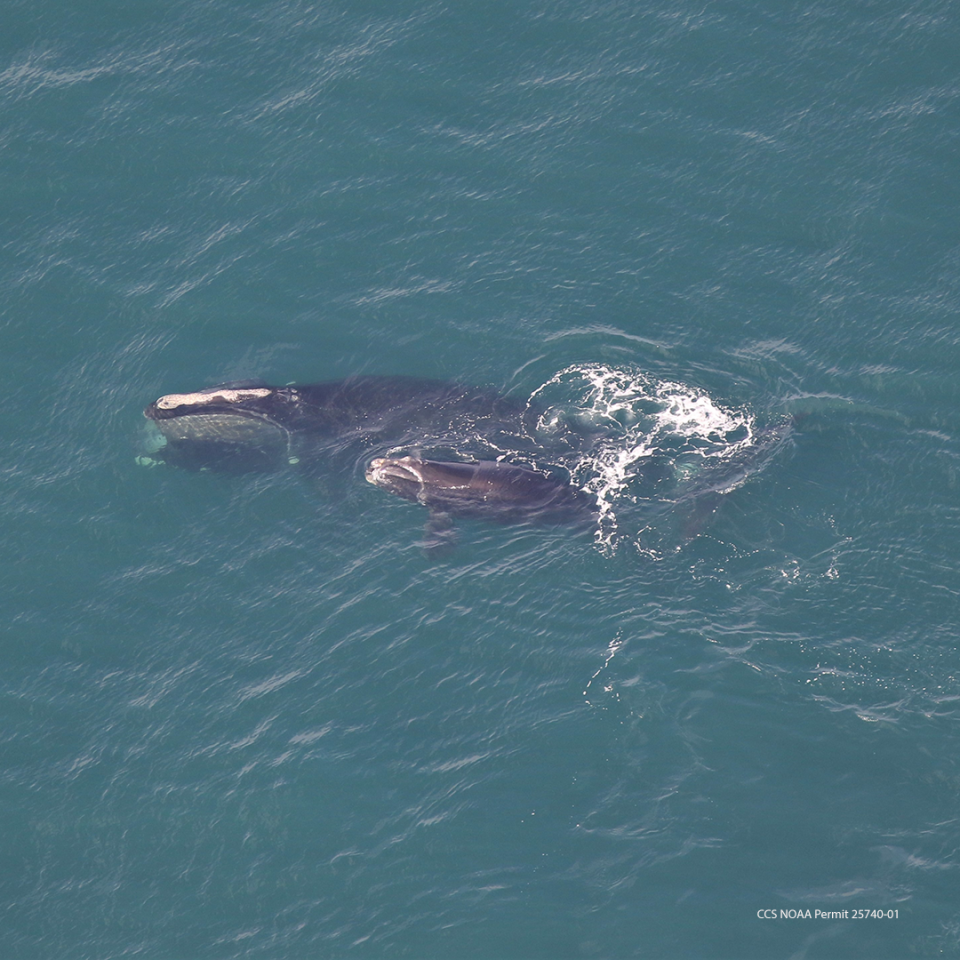Meet Porcia and her baby: Season's first North Atlantic whale mom, calf in Cape Cod Bay
Just in time for the official start of spring, the first North Atlantic right whale mother and calf pair of the season arrived in Cape Cod Bay over the weekend, touching off a new plea for all boaters to be alert and to observe the federal and state 10-knot speed restriction.
An aerial survey team from the Provincetown-based Center for Coastal Studies Right Whale Ecology Program saw the mother and calf on March 18. The sighting was officially reported on Monday.
The mother whale is known to scientists as Porcia (#3293 in the North Atlantic right whale catalog). She and her newborn were last spotted in late December in waters off the coast of Georgia, where the female whales typically go to give birth.

A rare animalReport: North Atlantic right whales continuing to decline
Right whale calf sightings are special events, scientists say.
While numerous North Atlantic right whales have been spotted feeding in the bay in recent weeks, this arrival is extra special.
"I've been doing this for lots of years. Because of the state of the population, and this calf (representing) hope for the future, it is exciting," said Charles "Stormy" Mayo, director of the right whale ecology program.

It's also exciting because scientists generally don't expect to see mothers and calves arriving just yet.
"The whales' entry into Cape Cod Bay appears to be getting earlier. It used to be the mothers and calves would come up from the south, where they are born, sometime in April. Last year we had one, I think, the first week of March. Things are changing in terms of timing."
The North Atlantic Right Whale Consortium released a report in the fall estimating only about 340 of the animals — plus or minus seven — remained during 2021. Because their numbers are so severely depleted, Mayo said, any sighting of a healthy calf is "a special event."
"Each one of these little animals — they're not really that little; this one is 13, 14 feet, maybe longer — is the hope for the future," he said.
Earlier in MarchWhales that swam into Cape Cod Canal were young. Researchers may know their mothers.
Boats and aircraft are legally prohibited from being within 500 yards of the whales.
North Atlantic right whales are protected under the federal Endangered Species Act and the Marine Mammal Protection Act. That designation legally prohibits boats and aircraft from approaching within 500 yards of them, according to the Center for Coastal Studies, and also restricts vessel speeds in designated areas, including Cape Cod waters. The greatest dangers right whales face are entanglement in traditional rope fishing gear and boat strikes, according to advocates and researchers.
Each year, most of the world's remaining North Atlantic right whales spend time in Massachusetts and Cape Cod bays, as they migrate back and forth between the Canadian Maritimes and southern waters off Georgia and Florida. This season, Center for Coastal Studies researchers observed right whales in Cape Cod Bay in late December, and continued spotting them throughout January and February. Earlier this month, a juvenile right whale swam almost the entire length of the Cape Cod Canal before turning around and returning to Buzzards Bay, while a second juvenile fed near the canal's outlet on Cape Cod Bay side, causing a nearly 22-hour closure of the waterway.
During the March 18 survey, Mayo said the team spotted a total of 52 right whales that included Porcia and her new offspring. Right whales have been seen from the shore off Herring Cove in Provincetown each day since March 16, he said. According to whalemap.org, most of the whales in the bay during March were in the eastern part of the basin, from Provincetown to Brewster.
Two young whales fall victimRight whale calf dangerously entangled off North Carolina. Seen free of gear last year off Massachusetts
A dozen right whale babies were born this season, which means hope for the endangered species.
Mayo said it's remarkable "in our little corner of the world" to be able to see most of the population of an "extraordinarily rare creature" pass through.
This season has seen the birth of 12 new right whales in their southeastern birthing grounds, one of which did not survive.
At present, only about a third of the right whale population is comprised of females, a concern because of the limited chances for reproduction. Of additional concern is that reproductive females are giving birth at longer intervals than in the past.
As for Porcia's calf, Mayo said, "the hope is that it's a female."
"If this is a precious female, that's a big deal, and hopefully she'll make it," he said. "It's a perilous sea they grow up in."
Taking it slowBoaters beware: Warmer waters put right whales in Cape Cod Bay at risk
This is likely Porcia's third baby, but the first she brought to Cape Cod Bay.
Porcia last gave birth in 2011, Mayo said, noting the calf is her third known to scientists who have been observing her for many years. Researchers are uncertain of her age, but know she is at least 21 based on her first recorded sighting in the Bay of Fundy in August of 2002.
With so many right whales and their calves visiting Cape Cod Bay over the course of a season, the Massachusetts Division of Marine Fisheries places a seasonal 10-knot speed restriction in the bay for vessels less than 65 feet in length from March 1 to April 30 — a time frame that can be extended if whales remain in the area. In addition, the National Oceanic and Atmospheric Administration has a 10-knot seasonal speed restriction in and around Cape Cod Bay for vessels 65 feet or greater.
Gain access to premium Cape Cod Times content by subscribing.
This article originally appeared on Cape Cod Times: Boaters urged to go slow with right whale mom, calf in Cape Cod Bay

